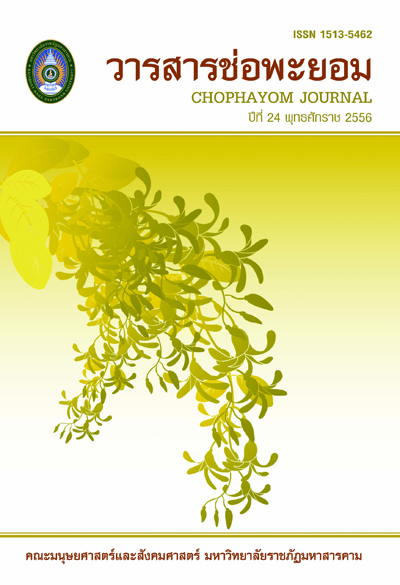ปัจจัยที่มีอิทธิพลต่อการได้รับการพัฒนาของอาจารย์ มหาวิทยาลัยราชภัฏในเขตภาคตะวันออกเฉียงเหนือ Factors Affecting Human Resource Development of Rajabhat University Lecturers in the North-East Regional Areas
Abstract
บทคัดย่อ
การวิจัยครั้งนี้มีวัตถุประสงค์เพื่อ 1) ศึกษาระดับการได้รับการพัฒนาของอาจารย์มหาวิทยาลัยราชภัฏในเขตภาคตะวันออกเฉียงเหนือ 2) ศึกษาปัจจัยที่มีอิทธิพลต่อการได้รับการพัฒนาของอาจารย์มหาวิทยาลัยราชภัฏในเขตภาคตะวันออกเฉียงเหนือ และ 3) นำเสนอข้อเสนอแนะในการพัฒนาอาจารย์มหาวิทยาลัยราชภัฏในเขตภาคตะวันออกเฉียงเหนือ ใช้ระเบียบวิธีวิจัยเชิงปริมาณและวิจัยเชิงคุณภาพ เครื่องมือวิจัย คือ แบบสอบถาม แบบสัมภาษณ์เชิงลึก และกรณีศึกษา ประชากรที่ใช้ในการศึกษา คืออาจารย์มหาวิทยาลัยราชภัฏในเขตภาคตะวันออกเฉียงเหนือ กลุ่มตัวอย่างคือ อาจารย์จากมหาวิทยาลัยราชภัฏมหาสารคาม มหาวิทยาลัยราชภัฏสุรินทร์ และมหาวิทยาลัยราชภัฏกาฬสินธุ์ จำนวน 284 คน ซึ่งได้มาโดยการสุ่มตัวอย่างแบบชั้นภูมิโดยใช้สถิติเชิงพรรณนาได้แก่ ร้อยละ ค่าเฉลี่ย และส่วนเบี่ยงเบนมาตรฐาน และสถิติอ้างอิงในการทดสอบสมมติฐาน ได้แก่ t-test, F-test และการวิเคราะห์ถดถอยพหุแนวคิดและทฤษฎีที่ใช้ในการวิจัยได้แก่ แนวคิดเกี่ยวกับการพัฒนาทรัพยากรมนุษย์ ทฤษฎีองค์การระบบปิดและระบบเปิด ทฤษฎีการพึ่งพาทรัพยากร(Pfeffer, 1982; Pfeffer&Salancik, 1978) ส่วนการสัมภาษณ์เชิงลึกใช้กลุ่มตัวอย่าง 9 คน โดยเลือกแบบเจาะจง ผลการศึกษาพบว่า
1) ระดับการได้รับการพัฒนาของอาจารย์มหาวิทยาลัยราชภัฏในเขตภาคตะวันออกเฉียงเหนือ โดยภาพรวมอยู่ในระดับค่อนข้างน้อย โดยอาจารย์ได้รับการพัฒนาด้านการศึกษาต่อน้อยที่สุด ขณะที่ด้านการเรียนรู้จากการปฏิบัติงาน อาจารย์ได้รับการพัฒนาอยู่ในระดับค่อนข้างมาก
2) ปัจจัยที่มีอิทธิพลต่อการได้รับการพัฒนาอาจารย์มหาวิทยาลัยราชภัฏ ได้แก่ (1) การสนับสนุนเชิงนโยบายของหน่วยงานภายนอก (2) การสื่อสาร (3) การสนับสนุนจากผู้บริหาร (4) ความร่วมมือกับหน่วยงานภายนอก และ(5) สิ่งจูงใจทางบวก อย่างมีนัยสำคัญทางสถิติที่ระดับ 0.05 ซึ่งสามารถพยากรณ์การได้รับการพัฒนาอาจารย์ได้ร้อยละ 47.3 ได้ข้อยืนยันทางทฤษฎีที่ว่า การพัฒนาอาจารย์ต้องอาศัยทั้งปัจจัยภายในองค์การ และปัจจัยสภาพแวดล้อมภายนอกองค์การ ถือเป็นการยืนยันทฤษฎีองค์การระบบปิดและทฤษฎีองค์การระบบเปิดว่ามีความสำคัญและมีความสัมพันธ์ที่เชื่อมโยงกัน นอกจากนี้ ผลการศึกษาวิจัยเชิงคุณภาพ ได้ยืนยันข้อค้นพบผลการศึกษาวิจัยเชิงปริมาณบางส่วนและได้สะท้อนความจริงว่า การพัฒนาอาจารย์ต้องเริ่มจากแรงจูงใจใฝ่สัมฤทธิ์ของตัวอาจารย์ก่อน
ABSTRACT
This study aimed at measuring the level of Rajabhat universitylecturer development and factors affecting that kind of development andcoming up with recommendations on how to improve human capital ofthis area. The focus of the research was on Rajabhat university lecturersin the northeastern region. Mixed methods of quantitative and qualitativeresearch were employed. For quantitative research, questionnaires wereused to collect data by using 284 samples out of 968 lecturers from RajabhatMaha sarakham University, Rajabhat Surin University and RajabhatKalasin University. Descriptive statistics were mean, percentage, andstandard deviation and inferential statistics utilized to test hypothesesincluded t-test, F-test and multiple regression analysis. Concepts andtheories for this research were human resource development, closed -opened system of organization theory and resource dependence theory(Pfeffer, 1982; Pfeffer & Salancik, 1978). For qualitative research, in-depthinterviews and case studies of university lecturer development were usedto substantiate and further explain the quantitative results.
The results of the research revealed that the level of lecturerdevelopment in Rajabhat universities in the northeastern region was lowas a whole. The chance of gaining further higher education developmentwas at the lowest level, while university lecturer learning from workingexperience was at the high level. Factors affecting Rajabhatuniversitylecturer development were; 1) policy support from external agencies, 2)organization communications, 3) support from executives, 4) cooperationwith external agencies, and 5) positive incentive. The hypotheseshad been confi rmed at the 0.05 level of statistical signifi cance. The mainmultiple regression equation used in the study had the explanatory powerat 47.3 percent. This fi nding confi rmed the theory that university lecturer development was relied on both internal and external organization factorswhich justifi ed the theory of the signifi cant relationship between closedsystem and opened system organization theories. Moreover, the results ofthe qualitative research partially confi rmed the fi ndings of the quantitativeresearch while refl ecting the fact that lecturer developing should start atthe lecturers’ personal achievement motives




